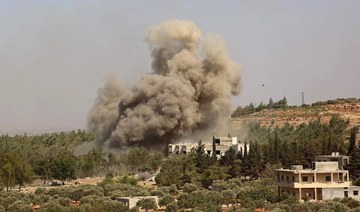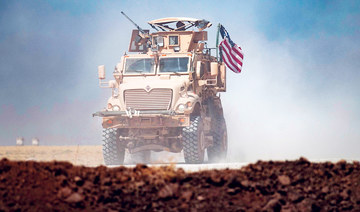ANKARA: The decision by the US to boost its military presence in Syria following an encounter with Russian forces has raised concerns about the message the move sends to Turkey, Russia and Iran, as Washington attempts to reinforce its deterrent role in the region.
However, experts said the show of force is unlikely to alter the status quo in the northeastern part of the country, which is already dominated by American and Syrian Kurdish YPG forces.
In addition to about 500 troops that were already in the area, the US has deployed six armored Bradley Fighting Vehicles and a further 100 troops to the region in what is interpreted as an effort to deter Russia from meddling in areas where US and Kurdish forces jointly operate.
Last month, seven American soldiers were injured during an incident in which a Russian armored vehicle collided with a US military patrol vehicle.
Russia and Turkey held a new round of talks on Sept. 15 and 16 in Ankara about the situation in Syria. However, they failed to reach a consensus about downgrading the latter’s military presence in the rebel-held Idlib province, where more than 20,000 Turkish troops are deployed.
Russia expects Turkish troops to withdraw from areas south of M4 highway, in line with a previous agreement between the two nations, but authorities in Ankara are unwilling to pull out as they want to clear the cities of Manbij and Tel Rifaat of YPG forces.
Alexey Khlebnikov, an independent strategic risk consultant and MENA expert at the Russian International Affairs Council, said that Turkey is likely to want something in return for reaching an agreement with Russia about deployment in Idlib.
“Moscow wants Ankara to pull out its troops from south of the M4 highway because that is what both sides agreed in March,” he said. “South Idlib in exchange for some concessions in the northeast and areas where Kurds are present might result in an agreement between Ankara and the Kremlin.”
The deployment of additional US forces is unlikely to affect the discussions between Turkey and Russia or alter the dynamics of their relationship, according to Samuel Ramani, a Middle East analyst at the University of Oxford.
“They are principally a symbolic warning shot to Russia not to harass or inflict harm on US forces in Syria,” he said. “But even their ability to deter Russian aggression is limited, as Moscow is very confident that the US would choose to withdraw from Syria rather than drag itself much deeper into the Syrian conflict, at least as long as Donald Trump remains president.”
The effect on the ground of the additional deployment will therefore be marginal, Ramani added, but it might lead to deeper discussions in Washington about the goals of the mission in Syria and whether the US needs to be there, which could have longer-term effects after the US elections in November.
Joe Macaron, a Middle East foreign-policy analyst at the Arab Center, said that the US sent additional troops to Syria to reinforce the defensive posture of existing forces.
“The White House only gave a green light for an additional 100 troops for 90 days, which incidentally coincides with the end of Trump’s first term,” he said.
Therefore, he added, the move is unlikely to have any significant effect on regional dynamics as Russia and Turkey await the outcome of the US elections, which could redefine Washington’s relations with Moscow and Ankara.


























